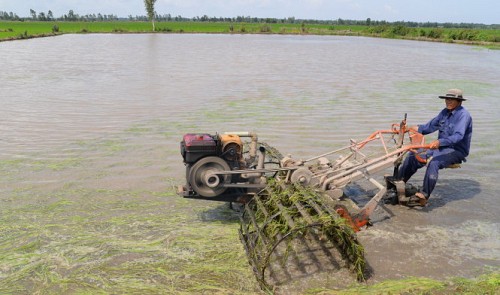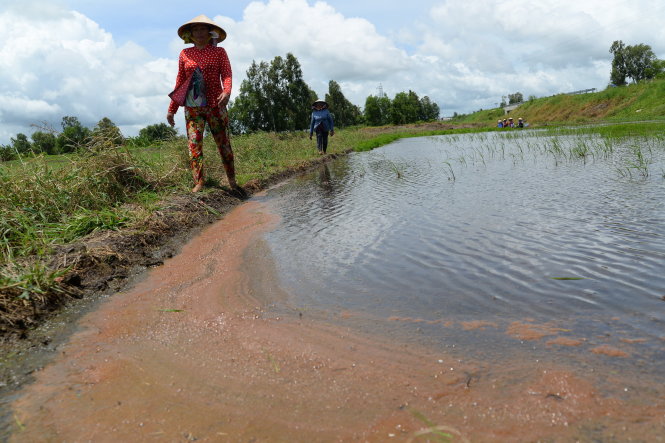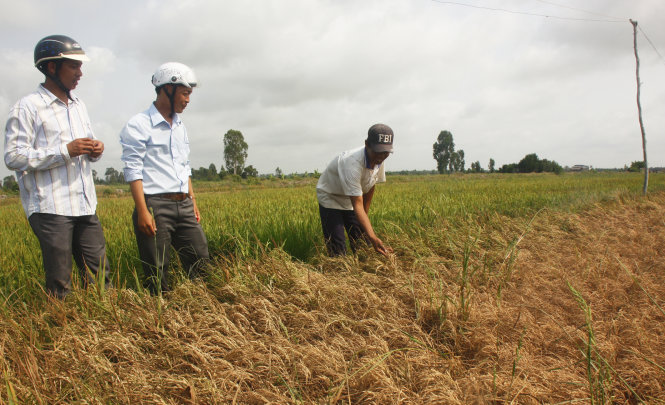Drought, salinity threaten millions of farmers in Vietnam’s Mekong Delta

The situation is so urgent that the government has organized a meeting with relevant ministries and leaders of all Mekong Delta provinces on Monday to discuss solutions.
The Mekong Delta includes 12 provinces -- Long An, Tien Giang, Ben Tre, Vinh Long, Tra Vinh, Hau Giang, Soc Trang, Dong Thap, An Giang, Kien Giang, Bac Lieu and Ca Mau -- and Can Tho City.
The total area of salinity-hit paddy fields in the area has been 139,000 hectares so far, with that number expected to be much higher by the end of next month, Minister of Agriculture and Rural Development Cao Duc Phat told the meeting, chaired by Prime Minister Nguyen Tan Dung.

Farmers are pictured near a salinity-hit paddy field in Kien Giang. Photo: Tuoi Tre
Ca Mau is the worst salinity-hit location, with more than 49,000 hectares of paddy crops affected. The respective figures for Kien Giang and Ben Tre are 34,000 hectares and 13,844 hectares respectively.
“If the drought continues until June, some 500,000 hectares of the summer-autumn rice crop will not be able to begin on time,” Minister Phat said.
The current drought has also resulted in a fresh water shortage for some 575,000 people throughout the Mekong Delta.
“Even restaurants, hotels, schools, hospitals and factories in Ben Tre are running short of fresh water,” the agriculture minister added.
Vietnam is expected to need some VND90 trillion (US$4.02 billion) for irrigation projects to ensure water supply and deal with climate change in the Mekong Delta for the 2012-20 period, according to the Ministry of Planning and Investment.
For 2016-20 alone, the required capital is about VND31 trillion ($1.38 billion).
The investment ministry has therefore suggested that the prime minister task relevant ministries and agencies with finding money for the projects and begining to work on crucial constructions as soon as possible.

Agriculture officials examine a dead paddy field due to salinity in Kien Giang.
Photo: Tuoi Tre
Farmers’ solutions
While macro-level solutions to fight drought and salinity are under discussion, Mekong Delta farmers have come up with their own ways of dealing with the harsh conditions.
When water is too salty to grow rice, Tran Van Huynh, a farmer in Hau Giang, has turned his five-hectare paddy fields into ponds to raise fish.
“I rake in up to VND5 million [$223] from every hectare just by raising fish there between May and June, which is better than growing rice,” he said.
The model has been widely adopted by other farmers in Hau Giang, whereas those in Hong Dan District, Bac Lieu, are farming shrimp instead of fish to make use of their paddy fields.
Since 2012, farmers in Hong Dan have also grown a special type of rice that is resilient to salt water.
“Even with a salinity rate of four percent, this rice still grows healthily and produces a good yield,” Nguyen Hoang Duong, a local farmer, said of his salt water resilient paddy crop.
What the stars mean:
★ Poor ★ ★ Promising ★★★ Good ★★★★ Very good ★★★★★ Exceptional
Latest News
More News
- 14th National Party Congress wraps up with success (January 25, 2026 | 09:49)
- Congratulations from VFF Central Committee's int’l partners to 14th National Party Congress (January 25, 2026 | 09:46)
- List of newly-elected members of 14th Political Bureau announced (January 23, 2026 | 16:27)
- 14th Party Central Committee unanimously elects To Lam as General Secretary (January 23, 2026 | 16:22)
- List of members of 14th Party Central Committee announced (January 23, 2026 | 09:12)
- Highlights of fourth working day of 14th National Party Congress (January 23, 2026 | 09:06)
- Press provides timely, accurate coverage of 14th National Party Congress (January 22, 2026 | 09:49)
- Press release on second working day of 14th National Party Congress (January 22, 2026 | 09:19)
- Minister sets out key directions to promote intrinsic strength of Vietnamese culture (January 22, 2026 | 09:16)
- 14th National Party Congress: Renewed momentum for OVs to contribute to homeland (January 21, 2026 | 09:49)
















 Mobile Version
Mobile Version